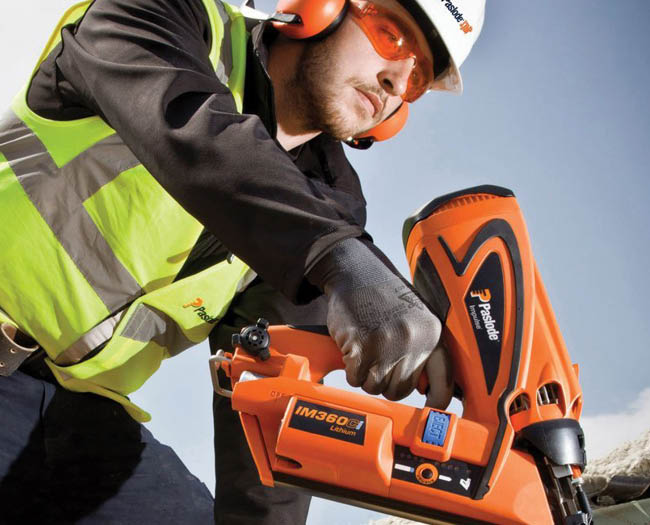Here at ITS we stock a wide range of first and second fix nailers so we’re often asked about which nailer is best for which job. So, here is a handy guide we’ve made to give you more information and make sure you get the right tool for the job.
Types
We can divide Nailers in to two different categories being First Fix and Second Fix. Both types are quite similar in their appearance but perform a very different job and getting the wrong one could be disastrous for your job.
First Fix
The first fix nailer (Also known as a framing nailer) are used to complete the rough preliminary wood work in construction such as framing, roofing, flooring, and anything that is generally fixed First or used as a frame for something else.
A first fix nailer fires large nails and will often leave a mark in the material, however, this is not such a huge issue because first fix nailers are really only used on areas that will not be going on show.
Nailers like DeWalt’s DCN690, Paslode’s IM360, and HiKOKI’s new NR90GC2 are the guns of choice for tradesmen on big construction jobs. The power, manoeuvrability, and the amount of control you have over how deep the nails can go make these tools absolutely invaluable.
Second Fix
A second fix nailer (Also known as a finishing nailer) fires a much smaller nail and makes hardly any impression on the work piece. This makes it the ideal tool to use for lighter duty work such as door frames, moulding, and general woodwork finishing.
Another key difference in a second fix nailer is the option to have them either angled or straight. Angled is most popular as they can be used in harder to reach places but straight nailers certainly have their place.
As with first fix nailers there are a variety of options to choose from for different levels of use with the some of the more popular second fix nailers being DeWalt’s DCN660, Paslode’s IM65, and HiKOKI’s NT65GB.
How do they work?
Pneumatic Nail Guns
One of the most common types of nail gun is the pneumatic nailer. These nailers use an air compressor as the propellant.
The compressor attaches to the tool via an air hose and then forces air into the tool, building pressure (measured in pounds per square inch, or PSI), until an optimum internal air pressure is reached. To ensure the correct amount of pressure is supplies, these compressors will come with regulators to give you full control over how much pressure is contained within the unit.
The pressure is released when the trigger is pulled, the tool’s internal piston pushes a slim blade forward at an incredibly high velocity and it is this blade that makes contact with the nail and drives it into the material.
As you continue to fire the nailer, the pressure inside will drop until the compressor kicks in again to restore the pressure to its previous level. This gives you extremely consistent firing power no matter the application.
While it can be a hassle to have your nailer constantly connected an air compressor, the trade off is that you simply will not get the power consistency with other types of nailer.
Pros
- Extremely powerful
- Consistent power
- Ideal for large projects
Cons
- Attached to a compressor via a hose which can become a hazard
- Needs an air compressor to work
Combustion Nail Guns
A combustion nailer works very similarly to a pneumatic nailer in that a blade is driven forward, strikes the nail, and forces it into the material. The difference is the way that blade is shoved forward.
As you have probably guessed, a combustion nailer uses combustion to create pressure in the same was as your car. These nailers have a specially designed combustion chamber that is positioned above the piston.
Gas cartridges feed flammable gas into the combustion chamber and a small spark generated from the battery or spark plug ignites this gas and generates the force needed to drive the nail.
These nailers are capable of delivering solid performance on heavy duty projects and come with the added benefit of not needing to carry around a cumbersome air hose and compressor. The trade off is that, for larger projects, you’re going to be changing gas cartridges quite often.
Pros
- Great power
- Extremely manoeuvrable
Cons
- If you’re on a big job you will go through gas cartridges at an alarming rate and replacing them is another expense to consider
- Gas cartridges do not perform well in the cold
- These guns are literally exploding on the inside so regular maintenance is absolutely critical
Battery Operated Nail Guns
Battery nail guns are the simplest models available which makes them ideal for DIYers and seasoned Tradesmen alike. Instead of using compressed gas or an explosion to generate force, these nailers use an electric motor to compress a power spring and, when you pull the trigger, the spring flies back and creates the force to drive the nail.
The biggest benefit of these nailers are their simplicity. No gas, no compressor, no air hose, and they’re ready to go straight out of the box. The biggest downside to these tools is that they are not quite as powerful as the gas and pneumatic models so tradesmen on large jobs may find them slightly lacking.
Pros
- Lightweight and easy to manoeuvre
- Hardly any running costs
Cons
- Not as powerful as other types
- Springs will lose tension over time so may need replacing
In Summary
Nail guns offer fantastic benefits and many tradesmen would be absolutely lost without their nailer, so they are definitely a fixture of any site and are here to stay.
With new battery technology emerging there is no doubt that some day a battery nailer will be available and have the same power as its pneumatic or gas driven brothers however, that day is not today.
It is important to carefully consider your needs, the needs of the job you are doing now, and potentially the needs of the jobs you may be doing in the future. As nail guns are not especially cheap, it is important to future proof your tools and ensure that you are clued up on how to look after them.
If you need any assistance with your nailer please don’t hesitate to give our friendly team a call on 0208 532 5000, drop us an email to: [email protected], or even just leave us a message in the comments below and one of our highly trained staff will get back to you with the proper advice!



